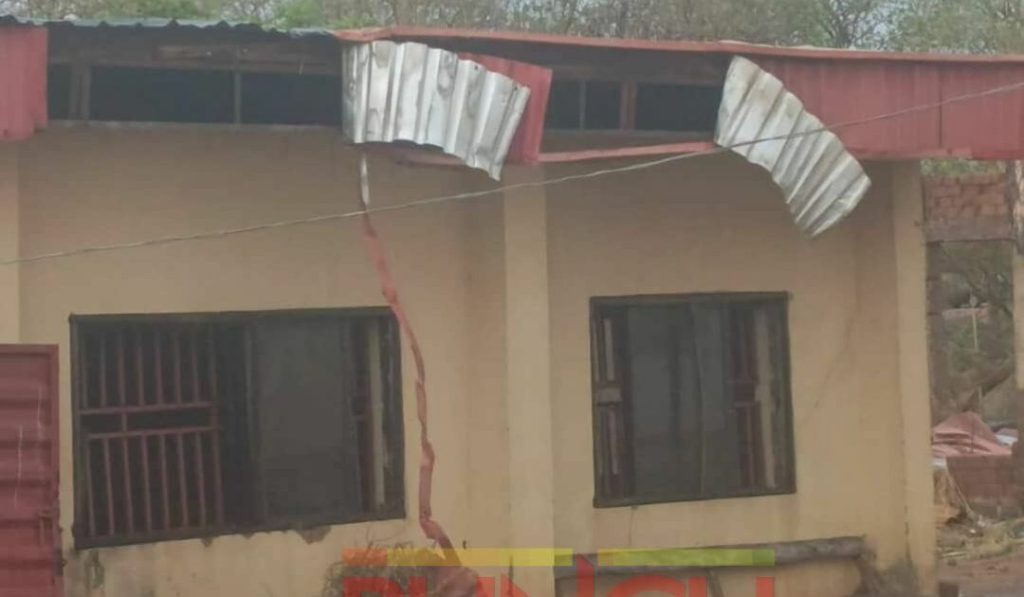A severe rainstorm wreaked havoc on the National Youth Service Corps (NYSC) Orientation Camp in Yikpata, Kwara State, Nigeria, causing extensive damage to property but thankfully resulting in no loss of life. The storm, which struck on Saturday afternoon, brought with it violent winds that ripped through the camp, tearing off roofs, damaging buildings, and uprooting trees. Among the structures affected were the administrative block, the multipurpose hall, the mosque, the camp market, and several hostels housing corps members and officials. Two vehicles belonging to camp officials were crushed by a fallen tree. Despite the significant material losses, all corps members and staff were safe and accounted for, with alternative accommodations arranged for those displaced.
The Kwara State Coordinator of NYSC, Mr. Onifade Olaoluwa, confirmed the incident, describing it as a devastating natural phenomenon. He expressed gratitude for the lack of casualties and detailed the extent of the damage. Olaoluwa acted swiftly, conducting an on-site assessment and informing the relevant government authorities. High-ranking officials, including the Kwara State Commissioner for Youth Development and the traditional ruler of the area, visited the camp to assess the damage firsthand and offer support to the affected NYSC community. The prompt response of these officials underscores the seriousness of the situation and the commitment to ensuring the well-being of the corps members.
Meanwhile, another rainstorm, occurring the day before the Yikpata incident, caused devastation in the Ilesha-Baruba community, also in Kwara State. This storm, however, tragically resulted in at least one fatality and numerous injuries. The storm’s force was such that it ripped off roofs, destroyed homes, and damaged warehouses storing foodstuffs. Residents described scenes of collapsed walls and flying debris, highlighting the storm’s intensity and destructive power. The Emir of Ilesha-Baruba, Professor Halidu Abubakar, noted the unusual severity of the storms this year, emphasizing the need for government intervention to aid the affected families.
The Ilesha-Baruba community was left reeling from the storm’s impact, with many residents rendered homeless and forced to seek shelter with neighbors. Alhaji Ibrahim Mora, a resident whose house was severely damaged, recounted the harrowing experience and expressed the community’s desperate need for government assistance. He described the collapse of his roof and fence and voiced concerns about the future, given the precarious state of many homes. Another resident, Abdullahi Ibrahim, shared a similar story of devastation, describing how the storm ripped the roof off his house and sent it crashing into another residence, causing further damage.
The recurring theme in the accounts of the Ilesha-Baruba residents is the urgent need for government support. They expressed gratitude for the initial sympathy shown by state government representatives but stressed the need for tangible assistance to help them rebuild their lives and homes. The loss of life, injuries, and widespread property damage have left the community vulnerable and in dire need of aid. The residents’ pleas highlight the critical role of government in disaster relief and the importance of timely intervention to mitigate suffering and facilitate recovery.
The two incidents, while geographically separate, highlight the vulnerability of communities to extreme weather events. The Yikpata incident, though resulting in significant property damage, thankfully spared lives, likely due to the robust infrastructure of the NYSC camp and the swift action of camp officials. The tragedy in Ilesha-Baruba, however, underscores the devastating consequences that such storms can have on less protected communities. Both events serve as a stark reminder of the importance of disaster preparedness, community resilience, and the crucial role of government in providing timely and effective assistance to affected populations.














